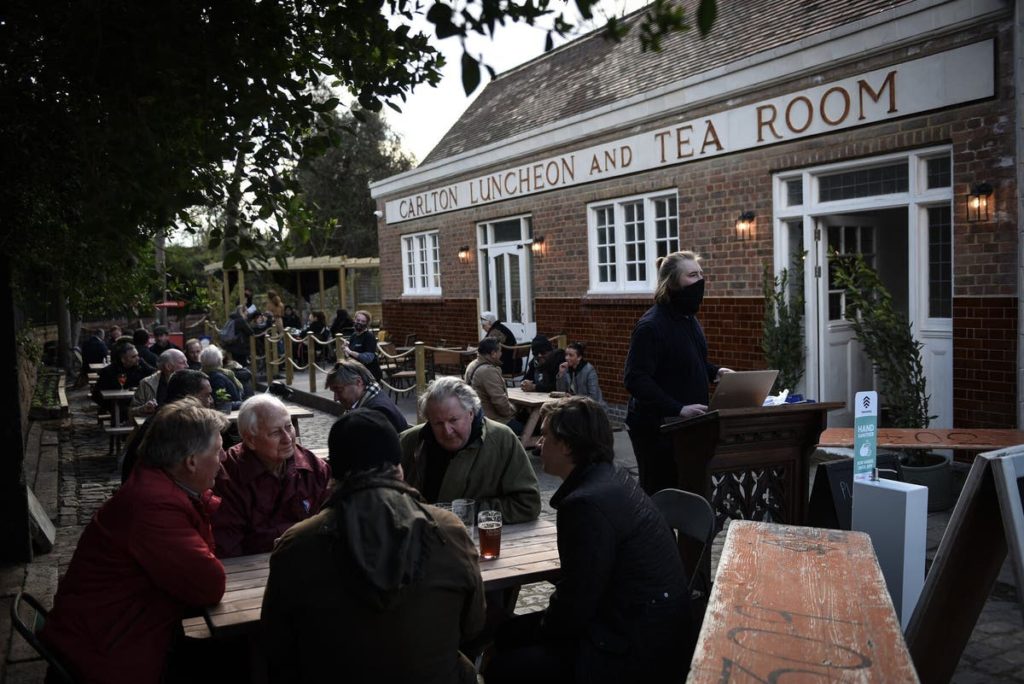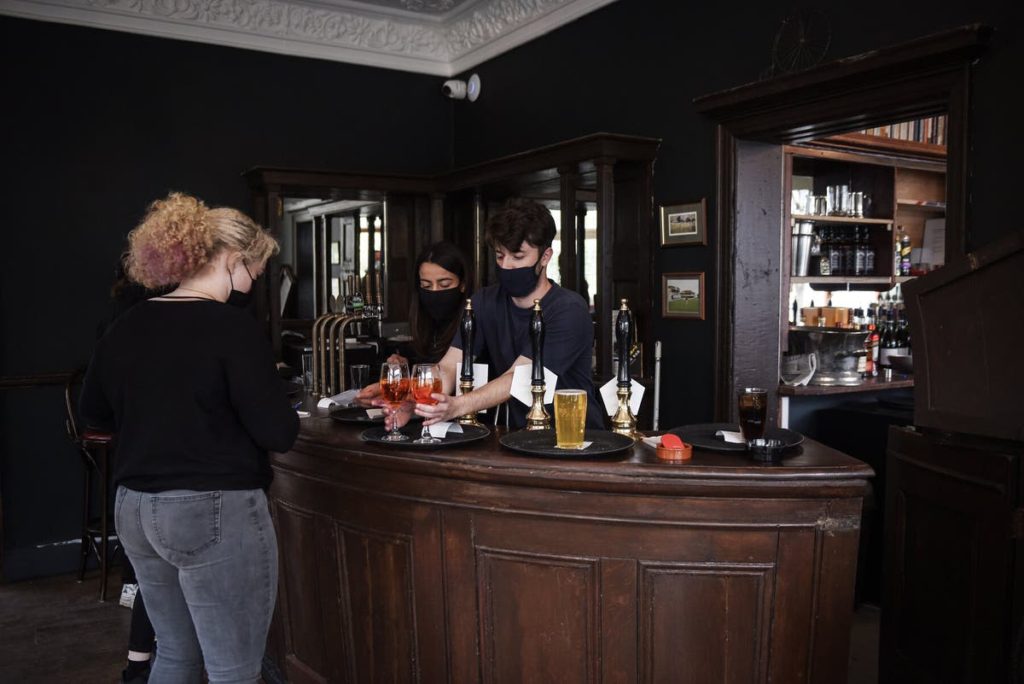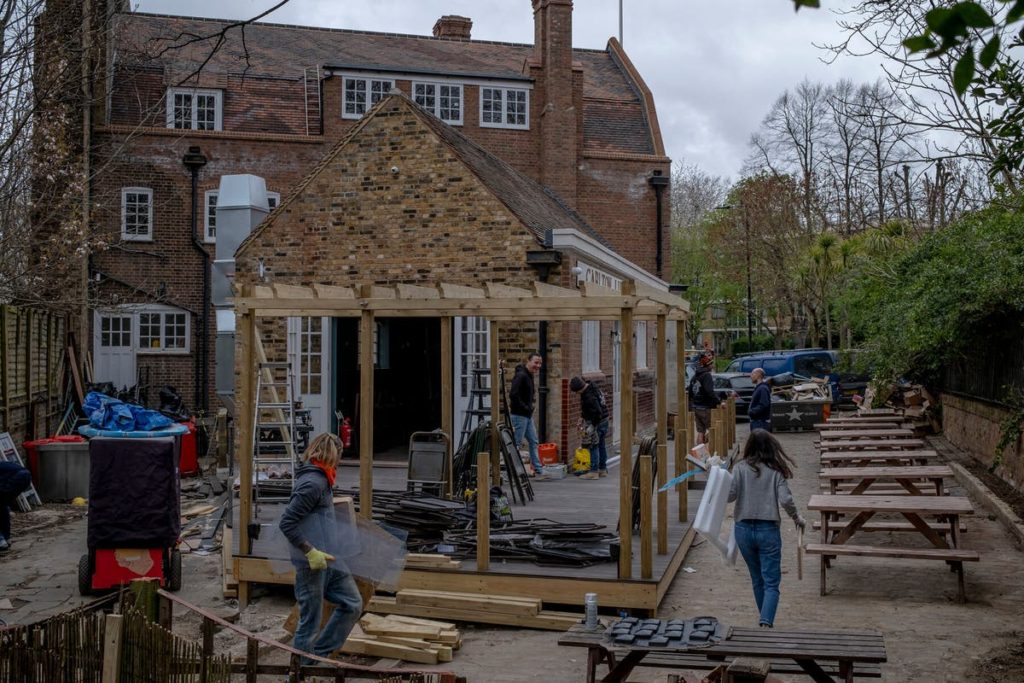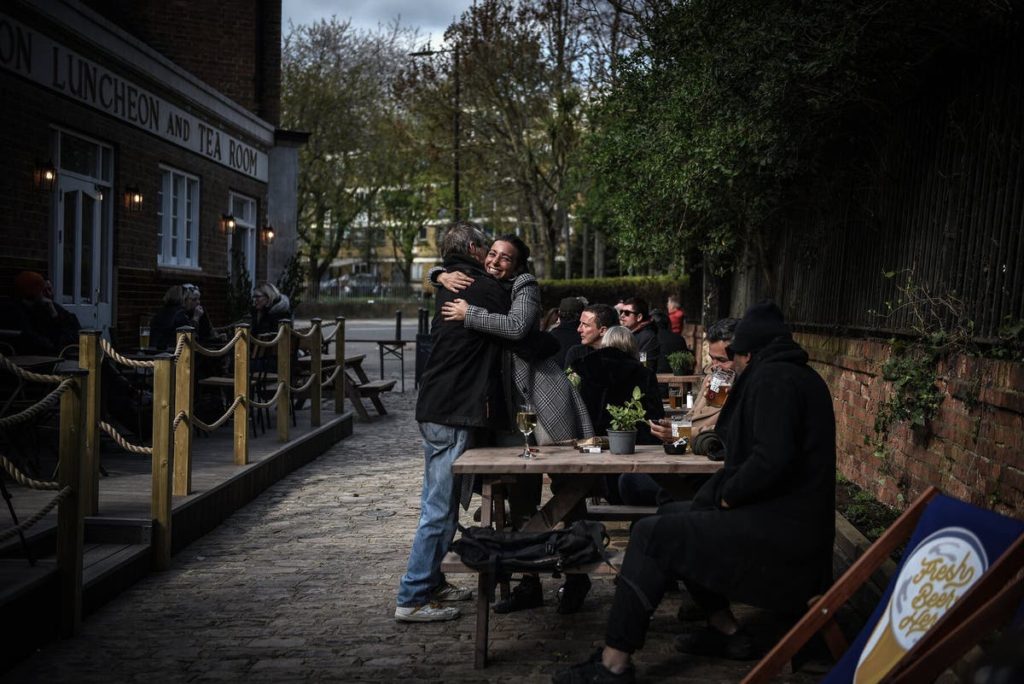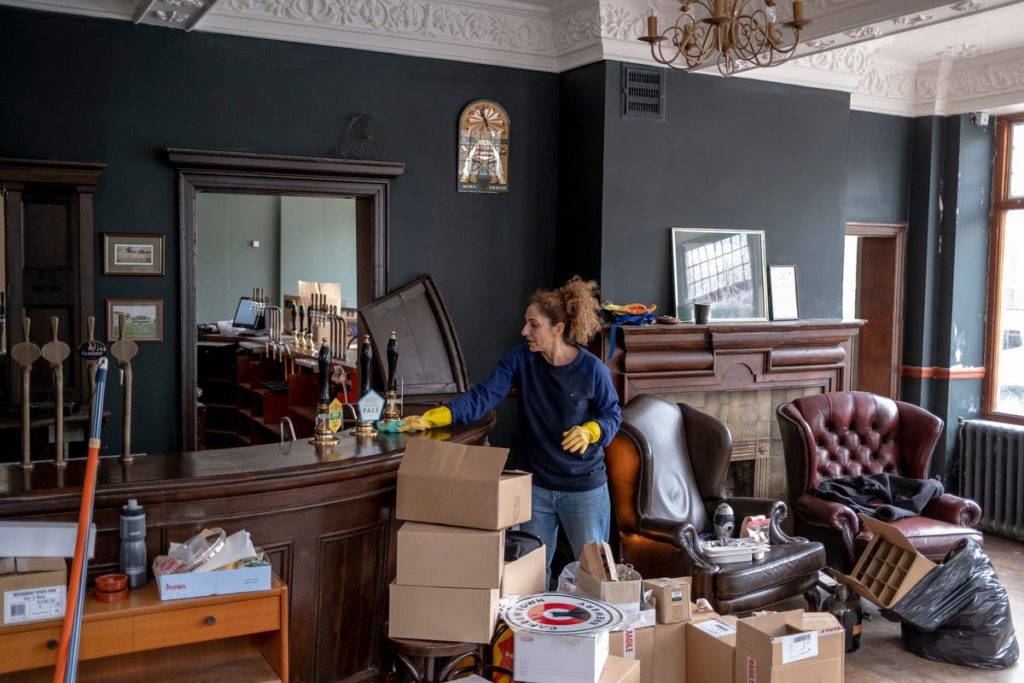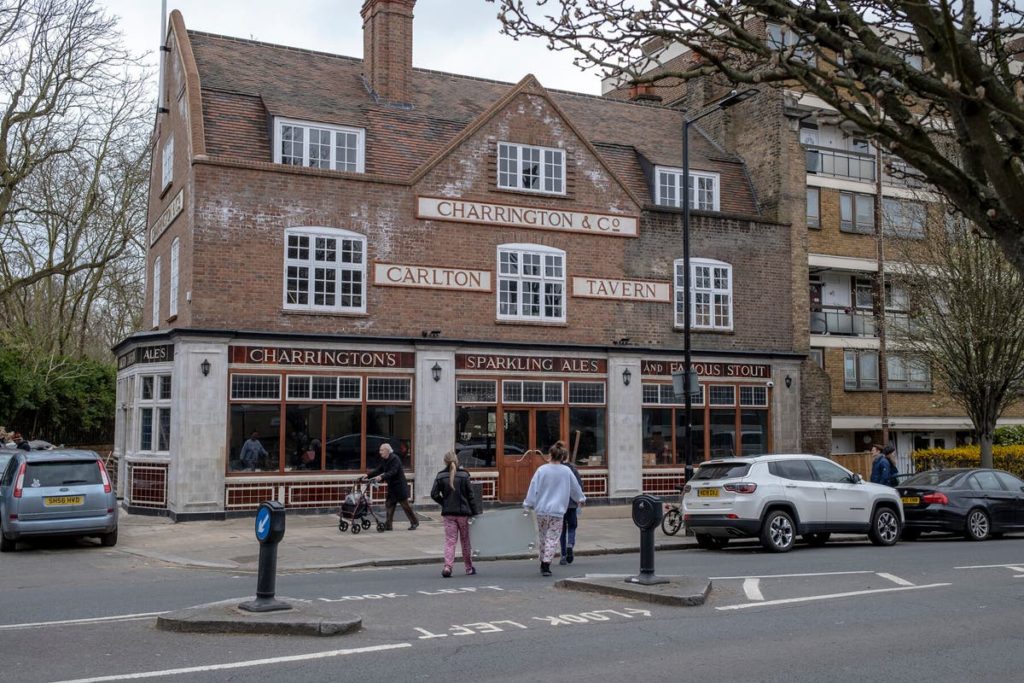LONDON — “Your local pub, it’s a bit like your favorite pair of shoes or jeans, something you just completely take for granted,” Rob Cope said, sitting outside the Carlton Tavern in North London on Monday.
With the glow of the afternoon sun easing the bite of the chilly April air, he gazed at the building’s brick facade and explained, “You don’t really understand that it’s there until it’s gone.”
The Carlton Tavern joined thousands of other pubs on Monday in reopening with outdoor spaces as lockdown restrictions in England eased after months of closures. But its story still stood out in that shared national moment, as its closure was counted not in months but in years.
Its story began when developers tore it down.
Six years ago, people watched in dismay as the Carlton Tavern, built in the 1920s and nestled against a park on the edge of the affluent Maida Vale neighborhood, was reduced to rubble. The building’s overseas owners had skirted local laws and abruptly demolished it to make way for luxury apartments.
Outraged, a group of neighborhood campaigners and local lawmakers fought for years to have the building restored. Eventually, the developers were ordered to rebuild it.

Six years ago, the Carlton Tavern was reduced to rubble by its overseas owners, who skirted local laws to make way for luxury apartments. They were eventually forced to rebuild it. Mary Turner for The New York Times
So when glasses were raised and meals shared outside the red brick building on Monday, the patrons were toasting a pub that was simultaneously brand-new and 100 years old as well as celebrating the reclamation of a piece of their community, and, in some cases, a piece of themselves.
Polly Robertson, one of the campaigners at the heart of the fight, laughed and chatted on Monday over fish and chips at the pub with her mother-in-law and sister-in-law, flitting among groups of campaigners, the pub’s new owners and neighbors. The generations of families seated around her were why she fought so hard for the place, she said.
“It’s wonderful coming in, just seeing people we haven’t seen in a long, long time,” she said, “not just because of Covid but because we had no location to meet up.”
Before the pub was demolished in 2015, the preservation society English Heritage surveyed the Carlton Tavern as it was being considered for historical status. The society recorded the layout of the pub’s rooms and took molds of its distinctive architectural features, so when it was time to rebuild, there was something to work with.
“It’s identical,” Ms. Robertson said.
From the ocher red letters spelling out “Charrington Sparkling Ales and Famous Stout” on its brick and tile facade to the swooping brass door handles to the elaborate plasterwork inside, the pub’s original charm and character has been recreated.
For some, the reopening was like welcoming back a long-lost friend. Neighbors likened the space to a communal living room where lives had played out and overlapped. They recalled decades of christenings, birthdays, first communions and wakes held within the tavern’s walls by local people who mostly lived in modest flats.

Preparing the tavern for its reopening. Andrew Testa for The New York Times
Martin Shannon has lived in London since 1965, and raised a family in the area. He came to the reopening of the pub with his wife, son and daughter-in-law on Monday. They paused to pose for photos at the sign out front and laughed as they shared a cherished memory of celebrating their son’s 30th birthday there more than a decade ago.
“These are the things the system walks over, average people’s ideas and norms all the time,” he said, growing reflective as he talked about the temporary loss of the pub. “It should survive anyway, and not be rolled over and knocked down.”
To many there, the building’s demolition had felt like a personal affront. Mr. Cope said it had amounted to someone coming in and stealing your favorite pair of shoes.
“It’s like someone saying: ‘You don’t matter. And your values don’t matter. Your memories don’t matter,’” Mr. Cope said, pausing to adjust his glasses. “It feels very deeply personal.”
Behind the pub’s reopening are Tom Rees and Ben Martin, business partners who have a connection to the area and a background running pubs. They hope to see the Carlton Tavern once again at the heart of the community.
“There have been people wandering past, wanting to talk to us, telling us great stories about how they used to work here, they used to drink here, how their parents used to drink here,” Mr. Rees said. “It’s amazing really.”

The Carlton Tavern first opened its doors in 1921. It was one of the few buildings on the street to survive bombing during World War II. Mary Turner for The New York Times
The middle of a pandemic may seem like a strange time to embark on a venture reviving a pub, especially with so many businesses struggling to survive, but Mr. Rees believes the prolonged lockdown brought a new appreciation for local spaces like this one. Their business, aptly named Homegrown Pubs, is focused on local beers as much as it is on the local people the proprietors hope to see return.
“I think the pandemic has forced people to re-evaluate their local area and their relationships to it, and all those great memories they had in these places,” Mr. Rees said.
It seemed fitting to its new owners that the pub’s rebirth would begin 100 years after its founding. The Carlton Tavern first opened its doors in 1921, and was one of the few buildings on the street to survive bombing during World War II.
Its location at the border of Kilburn and Maida Vale is also a junction of two London worlds. On one adjacent street, rows of glass and brick luxury apartment blocks face off against pockets of subsidized housing.
On Saturday, two days before the pub welcomed back visitors, the new owners and an army of workers and volunteers, including Ms. Robertson, were putting the finishing touches on the building. Outside, workers shook the dust from their hands as they heaved the last bits of construction waste into a dumpster, while others tidied inside to ready the Carlton Tavern for its big debut.

Polly Robertson, a leader of the campaign to rebuild the pub, worked on Saturday to get the building in shape for the reopening. Andrew Testa for The New York Times
As Ms. Robertson flitted between wiping down the wooden bar counter — salvaged from the original tavern — and preparing fresh juice for the other workers, she reflected on the changes she had seen since moving to the area in the 1980s.
For much of the latter half of the last century, the neighborhood was home to waves of immigrants, first from Ireland, then the Caribbean, the Middle East and Asia. Then came the developers and with them steep housing costs that pushed many from the once diverse, largely working-class area. But despite that, the community has remained close knit.
Ms. Robertson’s husband grew up in the area, and they raised two children there alongside generations of family. Seeing the Carlton Tavern restored and reopened will mean a lot, she said, particularly for older residents who built decades of memories within its red brick walls.
The whole aim was to save a space where people felt they belonged, in a city that has grown increasingly unfamiliar around them.
“The city can be a very lonely place,” Ms. Robertson said as she wiped a dusty film from a mirror behind the bar. “And this, it’s a familiar place. This is their place as much as anything.”

Many in the neighborhood took the pub’s demolition as a personal affront. Andrew Testa for The New York Times
FEATURED IMAGE: Pubs across England reopened on Monday as coronavirus restrictions eased. But the Carlton Tavern in London had been closed for years, not months. Mary Turner for The New York Times
By Megan Specia/The New York Times

